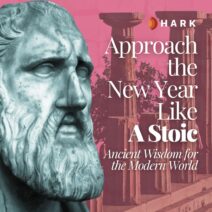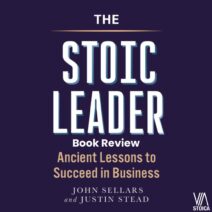What to Worry About? A Good or Bad Life is Your Choice
Choosing a Good or Bad Life
The Discourses of Epictetus, Book 1.25

“If these things are true, and we are not stupid or acting a part when we say that good or ill for man lies in choice, and that all else is nothing to us, why are we still troubled?”
Epictetus, The Discourses, Book 1, Chapter 25.1
In good Epictetus fashion, he doesn’t mince words. What to worry about when we know that good or bad is our choice? This discourse dives deep into the core of Epictetus’s interpretation of Stoicism and leans more toward the Cynics. How can anything outside our reason influence our state of being, unless we choose to give it that power?
Find more Epictetus quotes here.
“No one else has authority over the things that seriously concern us; and the things over which others have authority are of no concern to us. What is left for us to worry about?”
Epictetus, The Discourses, Book 1, Chapter 25.2
Where does our choice lie?
To understand where our choice lies, we need to know what we have authority over. This boils down to the internal and external worlds, my mind against fate. The Stoics believe in a deterministic universe where everything is governed by cause and effect. We humans have been given a little spark of the divine, reason, and logic, to observe what is happening and then choose to accept what is happening or fight against it.
When we realize that the only power we have is what is under our control, which is our thoughts, opinions, and actions, we learn to let go of our need to influence everything else. But we would like to control our possessions, our bodies, and the world around us because many are afraid of not being in control. This is fueled by our wants and desires of how we see our perfect world.
The Rules from Zeus
“Has he [Zeus] not given you what is your own, free from restraint or hindrance; and what is not your own, liable to both?”
Epictetus, The Discourses, Book 1, Chapter 25.3

What rules do we need to have to live the best possible way? When I look around me and observe my own life, I can see how complex we make our existence. The value we place on the things beyond ourselves. Those who are at the mercy of fate or fortune. No wonder we worry so much or judge our lives to be miserable. Most of our goals to be happy lie outside of our control.
What to worry about then? Let’s focus on our character and soul. Making sure we follow our nature by listening to our inner voice, our connection to the universe. But we insist on tying our entire existence to the outward display of things, titles, and external opinions.
“Guard by every means what is your own: what belongs to others do not covet. Your good faith is your own; your sense of shame is your own.”
Epictetus, The Discourses, Book 1, Chapter 25.4
What to be concerned with?
“When you concern yourself with what is not your own, you lose what is your own.”
Epictetus, The Discourses, Book 1, Chapter 25.4
One major point of Stoicism is to keep your personal freedom and not become a slave to externals. The quote above encompasses this idea. When you start to place your worth and worry in the things that are not your own, you’ll lose what is your own. Your choice and freedom. Epictetus builds on this in the rest of this discourse.
The next question is then how long should we observe these rules and not break the game? Epictetus says we should do so for as long as it is agreeable. When things go well, it is easier to follow the game, but then we should be more mindful. During these times, we can fall into the trap of spending our time with people who move us away from the good life. It stops being agreeable or advantageous when you can no longer preserve what is becoming and appropriate.
Judge for yourself, keep your choice
“And it is for you to compare the value of these things, and judge for yourself; but do not do anything as one who is burdened and afflicted and supposes himself to be in a bad way, for no one compels you to do that.”
Epictetus, The Discourses, Book 1, Chapter 25.17
“For you must always remember and hold fast to this, that the door is open.”
Epictetus, The Discourses, Book 1, Chapter 25.18

When everything goes as we want or the exact opposite happens, we always have a choice. We need to make sure we judge our situation objectively and keep our character and soul in mind when making a decision. Don’t turn a hypothetical or imagined situation into a real one. That is your mind’s doing. Keep it based on the truth. Do this, and you will remain free and at peace.
How can we do this when we need to make money, listen to our boss, or follow the rules of society? We can follow the rules, but understand that they cannot control our minds or thoughts. In the end, and especially at death, we are all equal, but we can make sure we preserve our peace of mind by doing the right thing in the present.
Demetrius Vs. Nero
“Thus Demetrius said to Nero: You threaten me with death, but nature threatens you with it!”
Epictetus, The Discourses, Book 1, Chapter 25.22
The Emperor Nero thought he had power over Demetrius by condemning him to death. But the Cynic philosopher took that away from him by placing him on the same level that nature places us all. He knew where his true value lay. Not in his body or his possessions, but in keeping his peace of mind, accepting his fate, and letting go of what is not his own.
“If I place value on my body, I have given myself up for a slave; if on my miserable property, I am a slave likewise; for I immediately show to my own detriment how I may be taken.”
Epictetus, The Discourses, Book 1, Chapter 25.23-24
Worry is one price you pay

This last part of the discourse reads a bit like the saying: ‘Be careful what you wish for.’ This is a common message throughout Epictetus’s teachings. Or it’s closer to a reminder of being aware of the price you have to pay for your wants and desires. Do you wish to be rich and famous? Then make sure you’re willing to pay the price. Do you want to be well-connected and liked by everyone? Then make sure your behavior is to their liking. Reduce your worries about these external desires by focusing on what matters to you.
Then we return to the question: “What to worry about?”
“But for our part had rather study and practice anything than how to become unrestrained and free.”
Epictetus, The Discourses, Book 1, Chapter 25.31
Worry about how your actions impact your character and soul. Are they in accordance with your nature and the virtues? Then you’ll be able to judge your situation better and make the choices that are beneficial to you. As we can see throughout this discourse, whether we live a good or a bad life is our choice. To be free of worry, as well.
Want to explore more Stoic Practice?
Book a free consultation with one of our Stoic Coaches to get support. Or read about the other Discourses of Epictetus. Listen to the Via Stoica Podcast on Spotify, Apple Podcasts, or YouTube.
Author Bio
Benny Voncken is the co-founder of Via Stoica, where he helps people apply Stoic philosophy to modern life. He is a Stoic coach, writer, and podcast host of The Via Stoica Podcast. With almost a decade of teaching experience and daily Stoic practice, Benny creates resources, workshops, and reflections that make ancient wisdom practical today.
Related Posts
-
 Greek Stoic Philosophy Terms
Greek Stoic Philosophy TermsWhat Is Ekklisis? The Stoic Art of Avoiding What Harms Your Character
What Is Ekklisis? Ekklisis in Stoicism is the rational refusal to engage with what would damage one’s moral choice. The Stoic meaning of ekklisis is important because it teaches us what to turn away from, not out of fear, but out of commitment to living well. In daily life, ekklisis helps us step back from […]
Read more -
 Via Stoica Podcast
Via Stoica PodcastA Hark Audio Curated Stoic Playlist for 2026
At the start of a new year, there is often an unspoken promise that things will somehow be different. Calmer. More ordered. More predictable. Yet life rarely follows that script. Delays disrupt flights, plans break down, people drift away, and life brings events we cannot control. What we can work on, and what Stoicism has […]
Read more -
 Book Reviews
Book ReviewsThe Stoic Leader by John Sellars and Justin Stead
The Stoic Leader introduces Stoicism as a practical philosophy and explores how its principles shape leadership, judgment, and character in both work and life. Summary Written by John Sellars and Justin Stead, The Stoic Leader offers what is effectively two books in one. Sellars provides an introduction to Stoicism and its philosophical foundations, while Stead […]
Read more


Comments 0